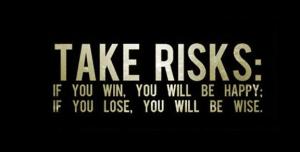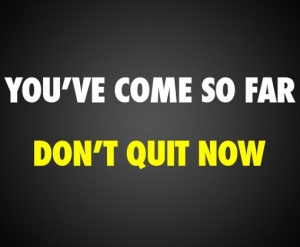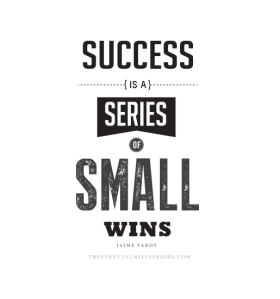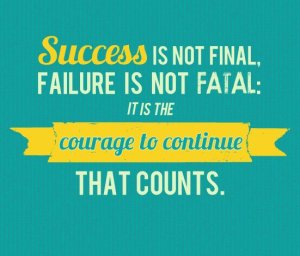 Entrepreneurs are known as risk-takers. Whether the risk involves investing a large sum of money into a new venture or hiring a new employee, it’s critical to evaluate whether the risk is worth taking.
Entrepreneurs are known as risk-takers. Whether the risk involves investing a large sum of money into a new venture or hiring a new employee, it’s critical to evaluate whether the risk is worth taking.
I’ve taken my own share of risks from the time I started my first business to now owning multiple businesses, and I’ve come to notice a few distinct methods I use to make my decisions whenever risk is involved. Here are a few tips I can offer from my time as an Entrepreneur:
Evaluate What’s at Stake – When presented with a major decision, I sit down and jot down what I’ve got to lose, as well as what I have to gain. Keep in mind that it’s not always money that’s at stake – you could also have personal stake or even mental stake in something. If you’re in too much mental anguish over a big risk, it’s often best to just let it go.
Estimate the Probability of Loss and Trust your Gut – Although you may not be able to determine the exact probabilities of success and failure, you should be able to reasonably estimate it thanks to your time as an entrepreneur. Sometimes though, this means that you’ll have to trust your gut. I can understand that sometimes it’s hard to listen to a quiet voice from within, but if you listen hard enough you’ll sometimes get the most profound wisdom. However…
How Realistic are your Fears? – Listening to your gut sometimes means listening to your fears, and let’s admit it: sometimes you over-exaggerate a negative outcome because fear comes into play. I’ve mentioned this before in the past, but it’s important that I reiterate it here. Take a step back and seriously consider how realistic your fears are before you back out. Don’t let a moment of fear become a lifetime of regret.
Discuss It with Mentors and Peers – Like with most things in life, you can accomplish much more with people than you can on your own. This means seeking out advice when you need it as well. Don’t just think that a mentor can provide you the best information either. Talking to your leadership team, your whole entire team or even just close friends will give you much needed perspective and let you truly evaluate how big a risk actually is.
Take the time to take a step back from a major risky decision in order to get an objective view on it. Sometimes things aren’t as bad as they seem – and sometimes they’re worse. These are just a few of the tools that I have found useful when I am just stuck and don’t know whether to accept a risk or let it go. How do you decide whether or not to take risk?

 Whether you only have one employee or 50 employees, execution will always be difficult. By execution I mean of course the way that you are completing tasks that will grow your business, and deliver positive results either to your leadership in the company or to yourself.
Whether you only have one employee or 50 employees, execution will always be difficult. By execution I mean of course the way that you are completing tasks that will grow your business, and deliver positive results either to your leadership in the company or to yourself. I’ve made plenty of mistakes during my time as an entrepreneur. While I could have dwelled on them and got crushed by them, luckily I’ve always used them as lessons to push me forward. That being said, there’s a reason why mentors are usually those who are older than us.
I’ve made plenty of mistakes during my time as an entrepreneur. While I could have dwelled on them and got crushed by them, luckily I’ve always used them as lessons to push me forward. That being said, there’s a reason why mentors are usually those who are older than us. By nature, an entrepreneur runs head first into things regardless of the risk, meaning that sometimes we make mistakes that make us want to quit. Though it’s hectic and overwhelming, especially when dealing with multiple businesses, you need to learn to move past these small missteps to truly succeed.
By nature, an entrepreneur runs head first into things regardless of the risk, meaning that sometimes we make mistakes that make us want to quit. Though it’s hectic and overwhelming, especially when dealing with multiple businesses, you need to learn to move past these small missteps to truly succeed. In my blog post
In my blog post  There’s a big misconception when it comes to failure. Ever since we’ve been children, we’ve seen that failing is nothing but a negative experience. Teachers would be disappointed and parents would yell at you for failing a test. If you failed a course, you’d use up your valuable summer time taking make-up courses. There has always been negativity associated with failure.
There’s a big misconception when it comes to failure. Ever since we’ve been children, we’ve seen that failing is nothing but a negative experience. Teachers would be disappointed and parents would yell at you for failing a test. If you failed a course, you’d use up your valuable summer time taking make-up courses. There has always been negativity associated with failure. Many Canadians had faith in the Canadiens this year, as they were the only home-based team that made it to the playoffs. It’s no secret that I’m an avid fan of the Habs, so of course I found their loss this year particularly heartbreaking, given all that they had been through to make it that far. The team obviously knows where their weak points are and what they need to improve for next year. With the Habs learning lessons from their tough games, I also picked up on a few business related lessons while watching them play game six:
Many Canadians had faith in the Canadiens this year, as they were the only home-based team that made it to the playoffs. It’s no secret that I’m an avid fan of the Habs, so of course I found their loss this year particularly heartbreaking, given all that they had been through to make it that far. The team obviously knows where their weak points are and what they need to improve for next year. With the Habs learning lessons from their tough games, I also picked up on a few business related lessons while watching them play game six: